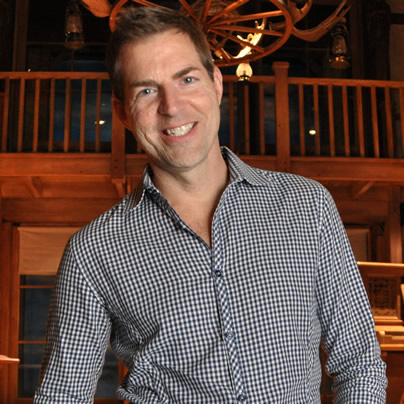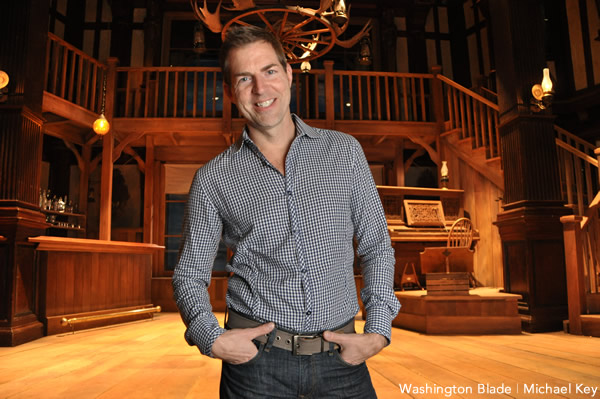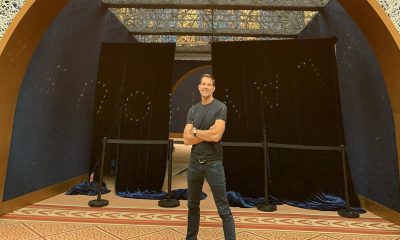Arts & Entertainment
Setting the stage
Gay theater designer says less is more in his field


Local theater set designer Tony Cisek whose long career in Washington has garnered him four Helen Hayes Awards. (Blade photo by Michael Key)
A playwright sets the scene with words, but it’s up to the scenic designer to bring it to life visually.
As one of D.C.’s top set designers, Tony Cisek is a master at transporting audiences to places both foreign and familiar. In this year’s season alone, he’s taken us to an exotic Cypriot encampment, a steamy Florida cigar factory, an airport terminal and with his most recent work — “The Taming of the Shrew” currently running at the Folger Theatre — the Wild West.
Cisek (pronounced Chis-eck) explains that while sets can range anywhere from totally abstract to highly realistic, his typically lie someplace in between. For Ford’s Theatre fall production of “Parade” (the musical account of the 1913 murder of teenage factory work Mary Phagan in Atlanta in 1913 and the subsequent lynching of her accused murderer Leo Frank two years later), Cisek’s design was serviceable yet haunting: he imagined a newly industrialized red brick Atlanta with two towering columns, each in unchecked stages of decay, standing as fading remnants of a more glorious South.
“The ‘Parade’ set was the result of over 20 sketches,” he says. “My favorite way to design is to distill and distill, to edit down until you have just what you need. I’m not good at decorating or excessive dressing.”
“I’m not interested in a purely naturalistic representation of something that leaves nothing to the imagination,” says Cisek, who’s gay. “I feel the audiences come to theater because they’re interested in doing a little work, in having to lean forward and fill in, and they have the capacity to do this. I like using elements that evoke certain feelings, times and places by using textures and forms.”
Growing up in Queens, New York, Cisek was introduced to set design while working stage crew on high school plays, but it was as a pre-med major at Georgetown University that he began to get serious about it. “A friend dragged me to a Masque and Bauble production [Georgetown University’s student-run theater group],” he says. “And I was blown away that people my age could do something with such artistry. I got involved and learned a lot. If you had the aptitude and the inclination you could do almost anything.”
Soon, Sunday evening phone calls home focused on shows and sets rather than organic chemistry. By Cisek’s senior year it was obvious to both him and his parents that a future in medicine was out and a career as a professional set designer was taking shape. He went on to study scenic design at New York University’s Tisch School of the Arts. After receiving his master’s in 1994, he planned to stay on in Manhattan, but things worked out differently. Offers from the Washington theater scene came fast and frequently (and have continued uninterrupted), so he and his longtime partner, a scientist, make D.C. their home.
For the four-time Helen Hayes Award winner, inspiration comes in many ways.
“I like to say I never know when the muse will descend,” says Cisek, 47. “Sometimes it’s in the not-fully awake early hours when your brain is figuring things out without you or when you’re fiddling with the white model [a preliminary small scale model] or Skyping across country with a director. Often the indispensable lighting and costume designers will have a great suggestion.”
But Cisek’s favorite path to inspiration is brainstorming with the director in the theater. In the case of Folger Theatre’s “Othello” that ran earlier this season, he and director Robert Richmond did just that, spending several hours chasing down ideas and scribbling on napkins. In time, sketches and models were rendered and the technical director oversaw the execution of the design. Ultimately, the result was a dazzling set that morphed from a towering canopy bed elaborately crowned in carved wood to magistrate’s office to billowing ship sails to a fabulously appointed Bedouin-style tent.
Like many designers, Cisek enjoys working with simpatico directors. This season he collaborated with gay director José Carrasquillo three times: WSC Avant Bard’s “Happy Days” (memorably encasing actor Delia Taylor in a gigantic dress); GALA Theatre’s “Ana en el Tropico”; and Arthur Miller’s “After the Fall” at Theatre J, all well-received productions.
José Carrasquillo says, “Tony is fearless in expressing his feelings and opinions, but most importantly he enjoys making theater. It’s a gift to have a designer that despite the hard work that goes into doing a show, would not be anyplace else in the world, but right next to the director and the other team members inside a theater making a story three dimensional.”
a&e features
Eastern Shore chef named James Beard Finalist
Harley Peet creates inventive food in an inclusive space

In a small Eastern Shore town filled with boutiques, galleries, and the occasional cry of waterfowl from the Chesapeake, Chef Harley Peet is most at home. In his Viennese-inflected, Maryland-sourced fine-dining destination Bas Rouge, Peet draws from his Northern Michigan upbringing, Culinary Institute of America education, and identity as a gay man, for inspiration.
And recently, Peet was named a James Beard Finalist for Best Chef: Mid-Atlantic – the first “Best Chef: Mid-Atlantic” finalist representing the Eastern Shore.
Peet, after graduation from the Culinary Institute of America, took a position as sous chef at Tilghman Island Inn, not far from Bas Rouge. Falling in love with the Eastern Shore, he continued his passion for racing sailboats, boating, gardening, and fishing, and living his somewhat pastoral life as he opened Bas Rouge in 2016 as head chef, a restaurant part of the Bluepoint Hospitality group, which runs more than a dozen concepts in and around Easton, Md.
Coming from a rural area and being gay, Peet knew he had his work cut out for him. He was always aware that the service and hospitality industry “can be down and dirty and rough.”
Now as a leader in the kitchen, he aims to “set a good example, and treat people how I want to be treated. I also want to make sure if you’re at our establishment, I’m the first to stand up and say something.”
The Bas Rouge cuisine, he says, is Contemporary European. “I’m inspired by old-world techniques of countries like Austria, Germany, and France, but I love putting a new spin on classic dishes and finding innovative ways to incorporate the bounty of local Chesapeake ingredients.”
His proudest dish: the humble-yet-elevated Wiener Schnitzel. “It is authentic to what one would expect to find in Vienna, down to the Lingonberries.” From his in-house bakery, Peet dries and grinds the housemade Kaiser-Semmel bread to use as the breadcrumbs.
Peet works to support the LGBTQ community inside and outside of the kitchen. “I love that our Bluepoint Hospitality team has created welcoming spaces where our patrons feel comfortable dining at each of our establishments. Our staff have a genuine respect for one another and work together free of judgment.”
Representing Bluepoint, Peet has participated in events like Chefs for Equality with the Human Rights Campaign, advocating for LGBTQ rights.
At Bas Rouge, Peet brings together his passion for inclusion steeped in a sustainability ethic. He sees environmental stewardship as a way of life. Peet and his husband have lived and worked on their own organic farm for several years. Through research in Europe, he learned about international marine sourcing. Witnessing the impacts of overfishing, Peet considers his own role in promoting eco-friendly practices at Bas Rouge. To that end, he ensures responsible sourcing commitments through his purveyors, relationships that have helped create significant change in how people dine in Easton.
“I have built great relationships in the community and there’s nothing better than one of our long-standing purveyors stopping in with a cooler of fresh fish from the Chesapeake Bay. This goes especially for catching and plating the invasive blue catfish species, which helps control the species’ threat to the local ecosystem.
Through his kitchen exploits, Peet expressed a unique connection to another gay icon in a rural fine-dining restaurant: Patrick O’Connell, of three Michelin starred Inn at Little Washington. In fact, Peet’s husband helped design some of O’Connell’s kitchen spaces. They’ve both been able to navigate treacherous restaurant-industry waters, and have come out triumphant and celebrated. Of O’Connell, Peet says that he “sees [his restaurants] as canvas, all artistry, he sees this as every night is a show.” But at the same time, his “judgment-free space makes him a role model.”
Being in Easton itself is not without challenges. Sourcing is a challenge, having to either fly or ship in ingredients, whereas urban restaurants have the benefit of trucking, he says. The small town “is romantic and charming,” but logistics are difficult – one of the reasons that Peet ensures his team is diverse, building in different viewpoints, and also “making things a hell of a lot more fun.”
Reflecting on challenges and finding (and creating) space on the Eastern Shore, Peet confirmed how important it was to surround himself with people who set a good example, and “if you don’t like the way something is going … move on.”

Team DC, the umbrella organization for LGBTQ-friendly sports teams and leagues in the D.C. area, held its annual Night of Champions Awards Gala on Saturday, April 20 at the Hilton National Mall. The organization gave out scholarships to area LGBTQ student athletes as well as awards to the Different Drummers, Kelly Laczko of Duplex Diner, Stacy Smith of the Edmund Burke School, Bryan Frank of Triout, JC Adams of DCG Basketball and the DC Gay Flag Football League.
(Washington Blade photos by Michael Key)




















The 2024 National Cannabis Festival was held at the Fields at RFK Stadium on April 19-20.
(Washington Blade photos by Michael Key)
















Covering the @NatlCannaFest at RFK Stadium for @WashBlade . Stop by the LGBTQ+ booth and pick up a paper if you are here. pic.twitter.com/is7hnsaPns
— Michael Patrick Key (@MichaelKeyWB) April 20, 2024
-

 State Department2 days ago
State Department2 days agoState Department releases annual human rights report
-

 Maryland4 days ago
Maryland4 days agoJoe Vogel campaign holds ‘Big Gay Canvass Kickoff’
-

 Politics3 days ago
Politics3 days agoSmithsonian staff concerned about future of LGBTQ programming amid GOP scrutiny
-

 The White House1 day ago
The White House1 day agoWhite House debuts action plan targeting pollutants in drinking water












